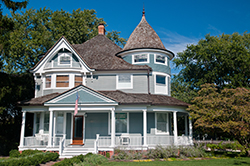By Margaret Wallace Brown
Deputy Director, City of Houston Planning & Development Department
In 2010, Houston City Council amended the Historic Preservation code and took a significant step toward strengthening the city’s historic preservation program. One year, and untold hours of meeting with the community, preservationists, architects, REALTORS®, builders and the public resulted in an improved code that protects historically and culturally significant neighborhoods while allowing structures to be appropriately adapted for current use. Today, more approximately, 6,700 properties located within Houston’s twenty-two historic districts enjoy protection from inappropriate demolition and alterations.
The City has now had four years of experience in administering the 2010 ordinance. For the most part, the ordinance seems to be working. In 2013, 93% of the 345 applications for a Certificate of Appropriateness (the required permit for new construction, demolition or exterior alterations to structures designated as Landmarks or located in a historic district) were approved by the Houston Archeological and Historical Commission. By all indicators, 2014 is on target to meet or exceed that percentage. However, looking back, staff and the community have noted a number of areas where the ordinance can be improved. For example, we have heard from the community their desire for simplified and expedited approval processes for smaller projects. In addition, we recognize that the criteria for new construction is unclear. We’ve seen that some of the terminology is contradictory or confusing. And we’ve experienced some challenges with specific processes, like the creation of design guidelines for districts created before the 2010 ordinance changes. It’s these kinds of issues that, when viewed together, led us to the conclusion that an update is warranted.
To that end, we have formulated a joint committee of the Houston Archeological and Historical Commissioners as well as Planning Commissioners – three from the Houston Archeological and Historical Commission, and two from the Planning Commission – to assist the Planning Department review the current code and make recommendations for improvement. These changes will be refinements to, not an overhaul of, the Historic Preservation ordinance. As Mayor Parker has said, the committee will take a scalpel, not a hatchet, to the code. The Mayor has requested that the committee complete its work by early 2015.
One of the hallmarks of this committee process is its transparency and inclusion. We have deliberately crafted a process for this update that is highly transparent and allows for all stakeholders to have the opportunity to provide input. For example, we are holding all committee meetings in the City Council chambers in the City Hall Annex. They will be held in the evening, when we believe members of the public are most available to be present and may be able to offer their comments to the committee. For the public that cannot attend the meetings, we are broadcasting them live on HTv and will place the recordings on our website at http://www.houstontx.gov/planning/historic-preservation/Historic-Preservation-Ordinance-Review. All agendas and materials distributed to the committee are also being placed on that page.
For community members who want to receive updates in their inbox, they can call (713) 837-7963 or email historic.ordinance@houstontx.gov and be placed on our distribution list.



